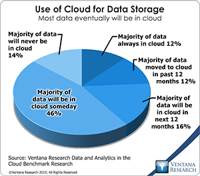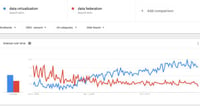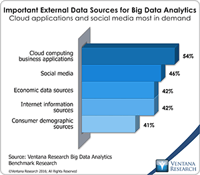About the Analyst

David Menninger
David is responsible for the overall research direction of data, information and analytics technologies at Ventana Research covering major areas including Analytics, Big Data, Business Intelligence and Information Management along with the additional specific research categories including Information Applications, IT Performance Management, Location Intelligence, Operational Intelligence and IoT, and Data Science. David is also responsible for examining the role of cloud computing, collaboration and mobile technologies as they affect these areas. David brings to Ventana Research over twenty-five years of experience, through which he has marketed and brought to market some of the leading edge technologies for helping organizations analyze data to support a range of action-taking and decision-making processes. Prior to joining Ventana Research, David was the Head of Business Development & Strategy at Pivotal a division of EMC, VP of Marketing and Product Management at Vertica Systems, VP of Marketing and Product Management at Oracle, Applix, InforSense and IRI Software. David earned his MS in Business from Bentley University and a BS in Economics from University of Pennsylvania.
I recently spent time at Strata+Hadoop World 2016 in New York. I attended this event and its predecessor, Hadoop World, off and on for the past six years. This one in New York had a different feel from previous events including the most recent event in San Jose at the end of March. Perhaps because of its location in one of the financial and commercial hubs of the world, the event had much more of a business orientation. But it’s not just location. Past events have been held in New York also,...
Read More
Topics:
Big Data,
Predictive Analytics,
Strata+Hadoop
I recently attended Oracle OpenWorld for the first time in several years. The message at this year’s event was clear: Oracle is all in on the cloud. I had heard the message, but I didn’t get the full impact until I arrived at the Moscone Center in San Francisco. All signage at the event contained the word “cloud,” and Oracle issued 18 press releases in conjunction with OpenWorld related to cloud computing. I also found out that Oracle has its own definition of “cloud.”
Read More
Topics:
Big Data,
Analytics,
Cloud Computing
Teradata recently held its annual Partners conference, at which gather several thousand customers and partners from around the world. This was the first Partners event since Vic Lund was appointed president and CEO in May. Year on year, Teradata’s revenues are down about 5 percent, which likely prompted some changes at the company. Over the past few years Teradata made several technology acquisitions and perhaps spread its resources too thin. At the event, Lund committed the company to a focus...
Read More
Topics:
Big Data,
Teradata,
Analytics,
Business Analytics,
Business Intelligence,
Cloud Computing,
Information Management
Ventana Research has newly published its Mobile Analytics and Business Intelligence 2016 Value Index. The Value Index provides a comprehensive evaluation of vendors and their product offerings across seven categories. In performing that analysis, I realized that this software category is at a crossroads. Once an optional capability often reserved for executives, mobile analytics is becoming a requirement of business users across organizations. The blurring of lines between work and personal...
Read More
Topics:
Mobile,
Analytics,
Business Analytics,
Business Intelligence
It’s part of my job to cover the ecosystem of Hadoop, the open source big data technology, but sometimes it makes my head spin. If this is not your primary job, how can you possibly keep up? I hope that a discussion of what I’ve found to be most important will help those who don’t have the time and energy to devote to this wide-ranging topic.
Read More
Topics:
Big Data,
Microsoft,
Teradata,
Business Analytics,
Business Intelligence,
IBM,
Information Management,
Operational Intelligence,
Oracle,
HPE,
ODPI,
Strata+Hadoop
Data virtualization is not new, but it has changed over the years. The term describes a process of combining data on the fly from multiple sources rather than copying that data into a common repository such as a data warehouse or a data lake, which I have written about. There are many reasons for an organization concerned with managing its data to consider data virtualization, most stemming from the fact that the data does not have to be copied to a new location. It could, for instance,...
Read More
Topics:
Big Data,
Business Analytics,
Business Intelligence,
Data Integration,
Data Lake,
Information Applications,
Information Management,
Data Virtualization
Predictive analytics is a rewarding yet challenging subject. In our benchmark research on next-generation predictive analytics at least half the participants reported that predictive analytics allows them to achieve competitive advantage (57%) and create new revenue opportunities (50%). Yet even more participants said that users of predictive analytics don’t have enough skills training to produce their own analyses (79%) and don’t understand the mathematics involved (66%). (In the term...
Read More
Topics:
Data Science,
Business Analytics,
Business Intelligence,
Business Performance,
Cloud Computing,
Uncategorized
Qlik helped pioneer the visual discovery market with its QlikView product. In some respects, Qlik and its competitors also spawned the self-service trend rippling through the analytics market today. Their aim was to enable business users to perform analytics for themselves rather than building a product with the perfect set of features for IT. After establishing success with end users the company began to address more of the concerns of IT, eventually creating a robust enterprise-grade...
Read More
Topics:
Analytics,
Business Analytics,
Business Collaboration,
Business Intelligence,
Cloud Computing,
Data Preparation,
Information Management,
Uncategorized,
Visualization,
Qlik,
Qlik Sense
It has been more than five years since James Dixon of Pentaho coined the term “data lake.” His original post suggests, “If you think of a data mart as a store of bottled water – cleansed and packaged and structured for easy consumption – the data lake is a large body of water in a more natural state.” The analogy is a simple one, but in my experience talking with many end users there is still mystery surrounding the concept. In this post I’d like to clarify what a data lake is, review the...
Read More
Topics:
Big Data,
Data Science,
Predictive Analytics,
Social Media,
Business Analytics,
Business Intelligence,
Data Governance,
Data Lake,
Governance, Risk & Compliance (GRC),
Information Management,
Uncategorized,
Strata+Hadoop
The emerging Internet of Things (IoT) is an extension of digital connectivity to devices and sensors in homes, businesses, vehicles and potentially almost anywhere. This innovation means that virtually any device can generate and transmit data about its operations – data to which analytics can be applied to facilitate monitoring and a range of automatic functions. To do these tasks IoT requires what Ventana Research calls operational intelligence (OI), a discipline that has evolved from the...
Read More
Topics:
Real-time,
Supply Chain Performance,
IOT,
Operational Intelligence,
Uncategorized





















